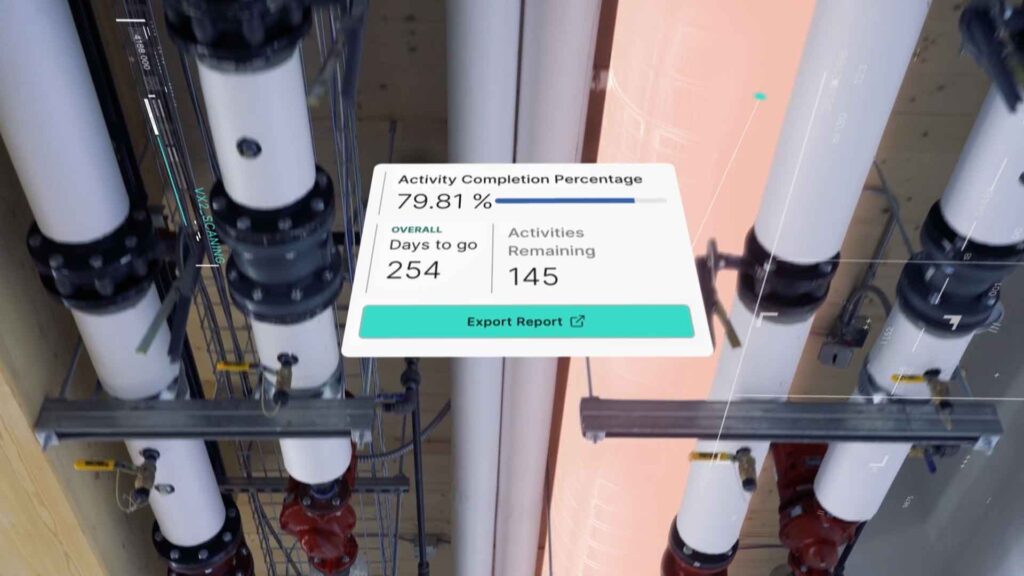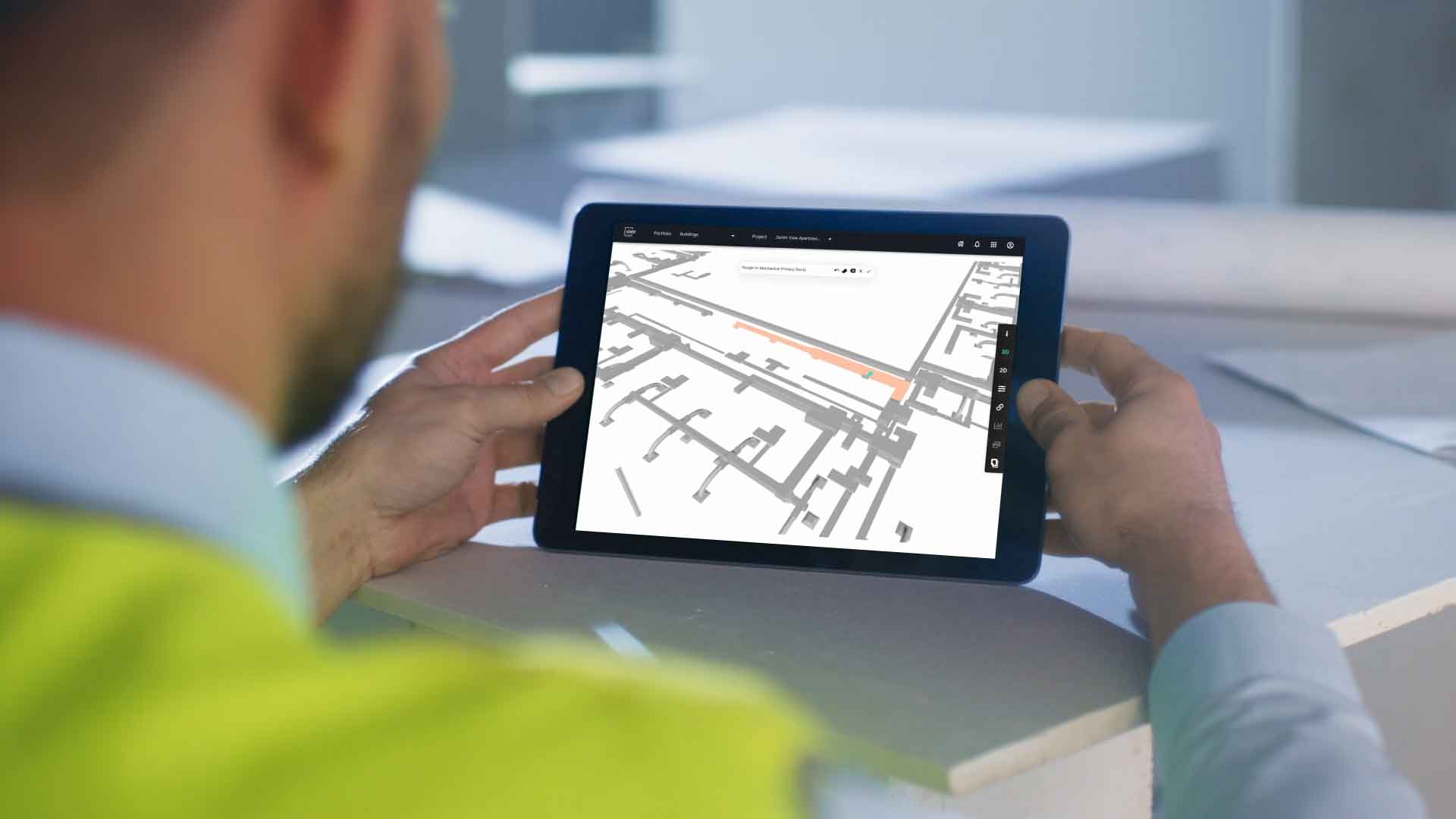From Manual to Modern: How AI is Changing Construction
The construction industry has experienced a significant transformation in recent years. This transformation has been driven by the increasing adoption of real-time data, construction project management and controls software, and scheduling optimization. McKinsey highlights that there is a strong demand for infrastructure. There is a shortage of skilled labor. These factors are increasing stakeholder pressure for data transparency and integration. Project management and controls are in need of accelerated adoption of digital technologies.
Construction falls behind other industries in adopting digital solutions. This is due to the complexity of construction projects, a lack of technology solutions that meet stakeholder needs, and a low tolerance for operational errors. Today, the availability of real-time data is fundamentally reshaping project delivery. The centralization of construction data serves as a key driver. By enhancing project timelines and reducing costly errors, data-driven decision-making enables construction companies to tackle traditional challenges more efficiently.
Construction Project Delays
Despite the availability of new construction project management and controls tools and other technologies, delays continue to be an issue across projects. According to BigRentz, fewer than 10% of infrastructure construction projects are completed on time. This implies that over 90% of construction projects exceed their budgets and fail to meet operational and strategic goals. So, why do delays persist across infrastructure, commercial, residential, and utility construction?
Over 90% of construction projects exceed their budgets.
source: bigrentz
Top 5 Causes of Construction Project Delays
A study by Touchplan, analyzing data from over 320,000 construction projects, identified the top five causes of delays:
- Inefficient handoffs
- Staffing and scheduling issues
- Material and equipment shortages
- Design changes
- Weather disruptions
These challenges often arise from inadequate project planning operations and tools, leading to limited visibility, poor communication, and uninformed decision-making. For example, failing to check the weather before scheduling concrete pours can result in costly disruptions. These kinds of weather delays are preventable. Project risk and costly rework increases when weather is imminent. With skilled labor being scarcer than ever, construction companies cannot afford to operate without predictive data.

Construction project management and controls software is leveling up the industry. These solutions play a critical role in helping the manage complex data, reduce delays, and prevent project creep. Effectively orchestrating real estate investment, land acquisition, aligning construction project teams, tools, equipment, regulations, and environmental factors remains one of the biggest challenges for construction project managers today. This underscores the heart of every project is its’ schedule.
Limitations of Traditional Construction Project Management and Controls Tools: Data, Tracking, Scheduling and Adoption
New technology and the ability to connect construction project data in the field have undoubtedly enhanced communication. Project management has increased its’ ability to provide informed decision-making and ROI analysis in construction. However, the complex nature of major construction projects still exists. This is coupled with the vast number of inputs and limited access to top talent which prevents construction teams from gaining true insights. Managing project risks and schedules is best done proactively. Mistakes are made when reaction takes priority without planning based on accurate project data.
Four major limitations persist, impacting both schedules and profitability:
1. Disconnected and Disjointed Data Streams
Project managers, construction managers, architects, site superintendents, and engineers are all familiar with the frustration of sifting through multiple documents. They must quantify, calculate, and update schedules. Data is often siloed, requiring significant effort to synthesize and bridge the gap. This challenge is present from the start of a project. When data inputs need to be harmonized, challenges continue as the project progresses without connected data. Too many individuals are responsible for ensuring data accuracy. Within each person’s specific roles, they miss the bigger picture and become distracted from critical project data connections within cross-functional tasks. When the team is not working from a single source of truth for project data, it is a project killer.
2. Complex and Inconsistent Progress Tracking
With independently updated data and large stakeholder teams, effectively communicating construction project progress becomes challenging. The manual effort involved in analyzing data, visualizing progress, and making potential adjustments is not intuitive. Manual processes are prone to errors due to inaccurate data inputs, personal interpretation, and inherent complexity. Maintaining an indisputable record of progress to improve outcomes and ensure full accountability is not achievable. Establishing a shared and trusted baseline for progress tracking is key to differentiating construction projects.
3. Uncertain and Uninformed Scheduling
The limitations in data input, combined with manual progress tracking, significantly impact scheduling. With constant uncertainties throughout a project, it’s no surprise that schedules often become speculative. Relying on incomplete data and lacking full transparency regarding available resources, tools, and materials inevitably leads to issues. This also drastically increases costs. If construction schedule integration is not updated automatically, accuracy depends on the entire team maintaining a perfect record. This induces a series of events to identify issues, understand impacts, and proactively adjust schedules.
Construction professionals know that human imperfections often derail schedules. Smart project scheduling software must eliminate human error. Take away guesswork and manual processes to ensure projects stay on track and within budget. Expecting data to be accurate and timely at all times – and all risks to be vetted – is clearly not a reflection of the realities on the construction site in today’s fast-paced environment.
4. Limited Integration and Lack of Adoption
Digital solutions and SaaS products are integral to all major construction project management and controls teams. While each piece of the technology stack plays a critical role on its own, teams can only unlock the true power of data when these streams are consolidated. Harmonizing all project inputs into a single source of data enables new insights into overall productivity and highlights inefficiencies. The construction industry, like many others, faces challenges with fragmented and difficult-to-integrate technology stacks. However, few industries feel the financial impact of delays as acutely as construction.
Implementing the Right Construction Project Management Processes
Despite the prevalence of smartphone-enabled field data collection and a variety of construction project management software tools, the majority of companies still struggle. Implementing and organizing technology tools into a cohesive system for decision-making is still a point of concern. Simply becoming more organized doesn’t automatically lead to smarter, more consistent, predictive, and proactive project management.
Given the long history of the construction industry and the vast amount of available data, why are people and technology still not working together more effectively to achieve more desirable results? Implementing tools doesn’t always go quickly and smoothly. Difficult processes can create confusion. Lack of adoption for construction professionals is common. It is critical to have the right team in place with an innovative mindset. The team needs to understand when and how to adopt new tools to improve project outcomes.
The Impact of AI in Construction: Transforming Project Outcomes and Efficiency
The construction industry is evolving. Integrating real-time data and advanced technologies like AI and predictive data analysis is becoming a competitive edge. These AI technology tools enhance efficiency in construction project management and controls. This increases the ability to stay on schedule, track progress with visualization, collaborate, mitigate project risk, and financial mismanagement. This is especially for true for large-scale residential, commercial, infrastructure, and utility projects. Traditionally, managing construction projects was, and at large scale still is, reliant on manual processes. This creates siloed data and fragmented communication, often resulting in costly delays.
Technology and Tools for Construction
AI has shifted the paradigm of what insights we can gather in real time from complex data models. Technology is changing the landscape by providing tools that enable the full scope of construction projects from real estate forecasting for smart land acquisition investment and intuitive construction project decision-making. This is also seen on Wall Street, in logistics, production, and other industries. These technologies allow project managers to harness real-time insights. Construction teams can automate complex tasks and predict potential risks. This leads to improvements in efficiency and reduces costly errors.
Data insights in construction are revolutionizing how projects are tracked. Project managers need to address challenges like data fragmentation, progress tracking issues, and inaccurate scheduling. By automating field data analysis, technology tools provide construction teams with consistent, accurate project tracking. This project data improves collaboration, communication, and project outcomes.
Predictive Analytics for Construction Projects
Predictive analytics play a critical role in forecasting potential delays and cost increases. This keeps teams in a position to make data-driven decisions for projects that are on schedule and within budget. As more construction companies adopt these technologies, they are seeing improvements. Projects are more accurate, efficient, and more successful overall. Creating and maintaining an indisputable record of progress and challenges significantly improves communication and shortens decision-making cycles. With data insights, construction teams can navigate the complexities of the project. This reduces risk, minimizing human error. It also ensures that projects are completed on time, within budget, and to the highest standards.
Transforming Construction Projects with AI: From Staffing to Weather Predictions
Construction technology is playing a transformative role in addressing key challenges in project management. AI-powered technology is managing delays by creating solutions for common problems. This includes inefficient handoffs, staffing, scheduling issues, material shortages, equipment shortages, design changes, and weather impacts. By streamlining data collection and enabling automated predictive analytics, AI in construction helps overcome these hurdles and enhances project efficiency.
For inefficient handoffs, AI-driven construction software automates communication between different teams. This ensures smoother transitions of tasks, full visibility, and more efficient workflows. Real-time data and actionable insights keeps all parties are on the same page. Construction teams can avoid delays caused by miscommunication. AI technology anticipates staffing and scheduling issues by predicting resource availability. This optimizes crew assignments based on workload, skill set, and site demands.
AI in Construction Project Management and Controls Software
Construction project management and controls software can utilize AI to automate the scheduling of labor and equipment. This prevents delays caused by uncoordinated or underutilized resources. The same AI-powered construction software also helps manage material and equipment shortages. Predicting supply chain disruptions and optimizing inventory management can reduce the risk of delays from expensive last-minute orders or shortages.
AI construction technology enables data driven decisions and more efficient outcomes. Data provides opportunities to review real-time analysis of design changes, which are a significant source of disruption. By integrating design revisions into the software system – and simulating potential impacts- AI ensures stakeholders can assess and respond quickly. This creates minimal impact on the project schedule. Finally, AI helps predict weather-related disruptions. With weather pattern predictions it can and providing warn project management. The construction team can in turn make more informed decisions about when to schedule weather-sensitive activities, such as concrete pours.
Adoption of AI for Construction Projects and Controls
As AI in construction project management adoption increases, these technologies are improving communication. This also reduces manual errors. Accurate data reporting provides insights that enable proactive risk management. In turn, this helps construction projects stay on schedule and within budget. According to a study by Deloitte, AI’s ability to process vast amounts of real-time data is transforming risk management. The construction industry needs to enable faster decision-making and more accurate forecasting.
As these technologies continue to evolve, they will redefine how construction projects are managed, driving operational efficiency and long-term success. AI in construction project management is undoubtedly becoming a competitive edge. This is illustrated by early adopters who are making their processes more efficient. While other construction companies are by still relying on cumbersome manual processes.
Case Study: AI-Driven Construction Software Improving Project Tracking and Delivery
A leading construction firm, known for its large-scale infrastructure projects, faced mounting pressure to meet deadlines while maintaining high-quality outcomes. One of the key challenges was inefficient and error-prone progress tracking and reporting systems, which relied heavily on manual processes. These outdated methods led to discrepancies in project data. Communication breakdowns and delays become a great risk for project managers and teams working with incomplete or outdated data.
To address this, the firm sought to create a unified source of project date. This streamlined progress tracking, eliminated guesswork, and improved collaboration. With Slate’s progress tracking software, the firm centralized construction project management data and controls schedules into one platform. This resulted in real-time reports with accurate progress tracking.
Slate’s AI-powered platform allowed for faster data capture and streamlined automated construction reporting, reducing time spent on administrative tasks. The software platform also facilitated better communication across teams, ensuring alignment and providing stakeholders with accurate, up-to-date information.
Construction Software Enablement Tool
Slate’s Progress tool is a tracking solution that allowed this construction firm to:
- Link BIM geometrics directly to tasks
- Visualize progress in an intuitive 3D model
- Automate real-time progress reporting
- Automate schedule updates
This construction giant was able to significantly reduce the operational load of the construction team. The solution was proactive in identifying issues, preventing delays, and enhancing accountability throughout the project lifecycle.
Read the entire case study here: Progress Tracking Case Study for Leading Construction Firm by Slate.ai
Construction Project Management and Controls is Evolving: From Manual Processes to AI-Driven Insights
The construction industry is undergoing a transformative shift. This shift is seen in the advanced data analytics and AI-driven technologies revolutionizing project management and collaboration tools, scheduling, and risk mitigation. Construction projects are managed with siloed data, manual tracking, and reactive decision-making. This leads to delays, cost overruns, and inefficiencies. However, the integration of AI and predictive data insights and analytics is changing the landscape. McKinsey highlights how AI tools enable real-time data collection. They can also automate scheduling and predict potential risks. The result is that project managers have the ability to proactively manage resources and timelines.
Deloitte points out that this convergence of AI, BIM, and digital models is reshaping the construction landscape. The convergence offers solutions that significantly reduce time and costs. These points drive operational success. As these technologies mature, they will become even more integral in transforming the industry’s approach to construction. These tools reduce uncertainty and improve project outcomes.
Construction Project Task Automation
By automating tasks like resource allocation, weather predictions, and material management, AI is enhancing the accuracy and efficiency of construction operations. The automations ensure projects stay on track and within budget. According to ConstructionDive, early adopters of AI in construction are already reporting improved project outcomes. They are benefiting from faster decision-making processes and more accurate forecasting. This mitigates risk and enhances efficiency. As AI continues to reshape the industry it minimizes errors, and give construction firms a competitive edge in an increasingly complex market.
Conclusion / TL;DR
In today’s fast-paced construction environment, general contractors must embrace modern project management tools. Data-driven approaches make construction teams stay competitive and ensure project success. Addressing inefficiencies, fragmented data, and manual processes is no longer optional. AI-powered construction management solutions provide the transparency, accuracy, and predictive capabilities needed to prevent delays, budget overruns, and miscommunication.
By centralizing data, automating scheduling, and leveraging real-time insights, contractors can proactively managing risk. They can now optimize resources and improve collaboration across teams. The integration of advanced technologies is not just an upgrade—it is a necessary shift. Construction can now meet the demands of increasingly complex projects while ensuring timely and cost-effective delivery. The time to modernize construction project management and controls practices is now. Those who adapt will lead the way in delivering efficient, high-quality construction innovation.
About Slate Technologies AI-Powered Platform
Slate Technologies offers specialized AI solutions tailored for real estate land acquisition and construction industries, delivering powerful data-driven insights uniquely suited to each sector. For real estate, Slate’s platform empowers investors and developers with advanced tools for market analysis, risk assessment, and forecasting, helping them identify high-potential opportunities and optimize investment strategies with data precision.
In construction, Slate’s digital assistant enhances project management by improving cost control, boosting productivity, schedule reliability, and providing dynamic decision support throughout the construction lifecycle. Backed by a team of top software engineers and industry experts, Slate is transforming both industries through targeted, AI-driven intelligence.
Sources:
https://touchplan.io/blog/study-schedule-delays

